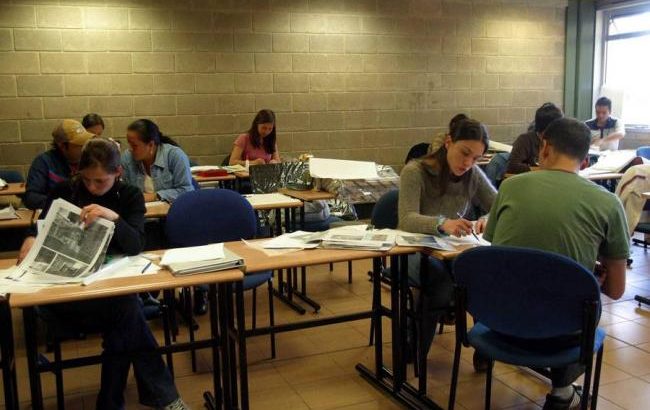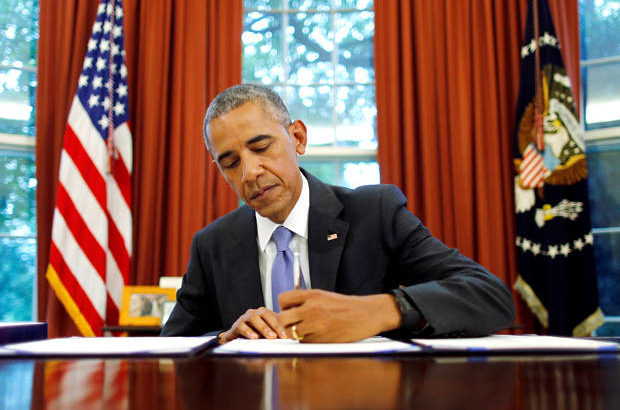Fuente: chicagosuntimes.com / 4 de julio de 2016
A recent op-ed in the New York Times [“Higher Education in Illinois is Dying,” June 3] has brought national attention to the shameful budget stalemate in Illinois, and its resulting devastation of our public universities.
By failing to secure a budget, Gov. Bruce Rauner has created a climate in which faculty and students alike have begun to flee, taking their talents and tuition dollars out of state. Springfield may think that our universities can sustain massive cuts to their operating budgets without lasting impact. As faculty at Illinois’ public universities, we come together here to say that they are wrong.
Education is the engine of economic growth in our state. The rapid decline in revenues that Illinois continues to experience will only worsen with disinvestment in the knowledge and skills of its citizens. All public servants, whether employed at the university or in state government, have a responsibility to fulfill. We cannot fulfill ours unless you fulfill yours. However we arrived at the current economic crisis, it cannot be bettered when compromise is only viewed as failure, and when precious state resources are used to further a political agenda. Inaction is not benign. The Illinois government is making a conscious decision that its public universities, the culmination of 150 years of state, federal, community, and private effort and investment, are expendable. This is unacceptable.
Article X of our state Constitution sets “the educational development of all persons” as a goal, promises “to provide for an efficient system of high quality educational institutions and services,” and assigns the state “the primary responsibility for financing the system of public education.” An engaged citizenry is the bedrock of democracy, and access to excellent and affordable public education is a civil right. Time is running out to ensure it.
Dana Rabin, LAS, University of Illinois at Urbana-Champaign
Catherine Prendergast, LAS, University of Illinois at Urbana-Champaign
Christopher Breu, CAS Illinois State University
Joyce Walker, CAS Illinois State University
Matt Felumlee, Department of English, Heartland Community College
Kerry O. Ferris, CLAS, Northern Illinois University
J.M. van der Laan, CAS, Illinois State University
Gary Weilbacher, CLAS, Illinois State University
Peter Ping Liu, School of Technology, Eastern Illinois University
Brian R. Horn, College of Education, Illinois State University
Claudia Janssen Danyi, College of Arts and Humanities, Eastern Illinois University
Susan Kalter, CAS, Illinois State University
Rebecca Saunders, CAS, Illinois State University
Amy Robillard, CAS, Illinois State University
James J. Pancrazio, CAS Illinois State University
Christopher C. De Santis, CAS, Illinois State University
Michael Day, CLAS, Northern Illinois University
Joe Amato, CAS, Illinois State University
Tania Ionin, LAS, University of Illinois at Urbana-Champaign
James Hye Suk Yoon, LAS, University of Illinois at Urbana-Champaign
Amy Rosenstein, College of Ed and Professional Studies, Eastern Illinois University
Ann Haugo, School of Theatre and Dance, Illinois State University
Deborah Wittman, College of Ed, Illinois State University
Sarah Hochstetler, CAS, Illinois State University
William Thomas McBride, CAS, Illinois State University
Jill Hallett, College of Education, University of Illinois at Chicago
Christina M. Borders, College of Education, Illinois State University
Phillip Eubanks, CLAS, Northern Illinois University
Olaya Landa-Vialard, College of Ed, Illinois State University
Lennard Davis, College of Medicine, University of Illinois at Chicago
Juliet Lynd, LAS, Illinois State University
Caroline Mallory, Mennonite College of Nursing, Illinois State University
E. Paula Crowley, College of Education, Illinois State University
Lea Cline, School of Art, Illinois State University
Jeff Rients, CAS, Illinois State University
Susan A Hildebrandt, CAS, Illinois State University
Rachel Shively, CAS, Illinois State University
Rick Hallett, CAS, Northeastern Illinois University
Russell Zanca, CAS, Northeastern Illinois University
Kathleen Renk, CLAS, Northern Illinois University
Diana Swanson, CLAS, Northern Illinois University
Richard Cameron, LAS, University of Illinois at Chicago
Marjorie Worthington, College of Arts and Humanities, Eastern Illinois University
Christine McCormick, College of Sciences, Eastern Illinois University
Robert Zordani, College of Arts and Humanities, Eastern Illinois University
Renee King, College of Arts and Humanities, Eastern Illinois University
Steve Brantley, Library, Eastern Illinois University
Angela Glaros, College of Sciences, Eastern Illinois University
Timothy N. Taylor, College of Arts and Humanities, Eastern Illinois University
Rena Shifflet, School of Teaching and Learning, Illinois State University.
Gabrielle M. Toth, Library Information Services, University of Illinois at Chicago
Diane Burns, College of Sciences, Eastern Illinois University
Jeannie Ludlow, College of Arts and Humanities, Eastern Illinois University
Edmund F. Wehrle, College of Arts and Humanities, Eastern Illinois University
Jennifer L. Stringfellow, College of Ed and Prof. Studies, Eastern Illinois University
Leila Porter, LAS, Northern Illinois University
Charles R. Foy, College of Arts and Humanities, Eastern Illinois University
Ann Brownson, Ballenger Teachers Center, Eastern Illinois University
Gary E. Aylesworth, College of Arts and Humanities, Eastern Illinois University
Marina Terkourafi, LAS, University of Illinois at Urbana-Champaign
Rosemary Buck, College of Arts and Humanities, Eastern Illinois University
Sonia Kline, College of Education, Illinois State University
Peter Andrews, College of Sciences, Eastern Illinois University
Robin L. Murray, College of Arts and Humanities, Eastern Illinois University
Ralph Cintron, LAS, University of Illinois at Chicago
Maria T. Pao, College of Arts and Sciences, Illinois State University
Gary Justis, College of Fine Arts, Illinois State University
Edward O. Stewart, College of Fine Arts, Illinois State University
Issam Nassar, College of Arts and Sciences, Illinois State University
Fern Kory, College of Arts and Humanities, Eastern Illinois University
Peter Hesterman, College of Arts and Sciences, Illinois State University
Marjorie Moretz Stinespring, College of Arts and Sciences, Chicago State University
Leroy Bryant, College of Arts and Sciences, Chicago State University
Carol Jean Dudley, College of Arts and Humanities, Eastern Illinois University
Jamie V. Ryan, College of Arts and Humanities, Eastern Illinois University
Jason Reblando, College of Fine Arts, Illinois State University
Ann Kuzdale, College of Arts and Sciences, Chicago State University
Shaila Christofferson, College of Arts and Sciences, Chicago State University
Fiona Ngo, LAS, University of Illinois at Urbana-Champaign
Mukti Upadhyay, College of Sciences, Eastern Illinois University
Michael Leddy, College of Arts and Humanities, Eastern Illinois University
Lee E. Patterson, College of Arts and Humanities, Eastern Illinois University
Steven E. Rowe, College of Arts and Sciences, Chicago State University
Kelly Harris, College of Arts and Sciences, Chicago State University
Iryce Baron, LAS, University of Illinois at Urbana-Champaign
Dennis Baron, LAS, University of Illinois at Urbana-Champaign
Eric Bollinger, College of Sciences, Eastern Illinois University
Amalia Pallares, LAS, University of Illinois at Chicago
Bill O’Donnell, College of Fine Arts, Illinois State University
Andreas Fischer, College of Fine Arts, Illinois State University
Scott Balcerzak, LAS, Northern Illinois University
Marcia Buell, College of Arts and Sciences, Northeastern Illinois University
Christina Bueno, College of Arts and Sciences, Northeastern Illinois University
Maureen Kelty, Daniel L Goodwin College of Education, Northeastern Illinois University
Brandon P. Bisbey, College of Arts and Sciences, Northeastern Illinois University
Lisa Wallis, Library, Northeastern Illinois University
Melanie Bujan, College of Arts and Sciences, Northeastern Illinois University
Lou Bohr, Daniel L Goodwin College of Education, Northeastern Illinois University
Alison Dover, Daniel L Goodwin College of Education, Northeastern Illinois University
Cyndi Moran, Professor, College of Arts and Sciences, Northeastern Illinois University
James Ball, Daniel L Goodwin, College of Education, Northeastern Illinois University
Kristin Carlson, College of Fine Arts, Illinois State University
Janet Halpin, College of Arts and Sciences, Chicago State University
James M. Skibo, College of Arts and Sciences, Illinois State University
Eric L. Peters, College of Arts and Sciences, Chicago State University
Katie Lewandowski, College of Sciences, Eastern Illinois University
James Stanlaw, College of Arts and Sciences, Illinois State University
Xóchitl Bada, LAS, University of Illinois at Chicago
Maria de los Angeles Torres, LAS, University of Illinois at Chicago
Richard Sullivan, College of Arts and Sciences, Illinois State University
Elizabeth A. Skinner, College of Education, Illinois State University
Eastern Illinois University, College of Arts and Sciences, Illinois State University
Grant C. Sterling, College of Arts and Humanities, Eastern Illinois University
Michael D. Gillespie, College of Sciences, Eastern Illinois University
Lauren M. Lowell, College of Fine Arts, Illinois State University
Víctor Alejandro Sorell, College of Arts and Sciences, Illinois State University
Therese Quinn, Architecture, Design, and the Arts, University of Illinois at Chicago
Cedric Johnson, LAS, University of Illinois at Chicago
Aleeca Bell, Nursing, University of Illinois at Chicago
Robert Johnston, LAS, University of Illinois at Chicago
Barbara DiEugenio, College of Engineering, University of Illinois at Chicago
John Abbott, LAS, University of Illinois at Chicago
Janet Smith, Urban Planning and Public Affairs, University of Illinois at Chicago
Joan Kennelly, College of Public Health, University of Illinois at Chicago
Aaron Krall, LAS, University of Illinois at Chicago
Laurie Quinn, Nursing, University of Illinois at Chicago
James Drown, LAS, University of Illinois at Chicago
Blake Simpson, Architecture, Design, and the Arts, University of Illinois at Chicago
Anthony Simon Laden, LAS, University of Illinois at Chicago
Laurie Schaffner, LAS, University of Illinois at Chicago
Paul Preissner, Architecture, Design, and the Arts, University of Illinois at Chicago
John Betancur, Urban Planning and Public Affairs
Jeffrey Sklansky, LAS, University of Illinois at Chicago
John D’Emilio, LAS, University of Illinois at Chicago
Marina Mogilner, LAS, University of Illinois at Chicago
Nicole Jordan, LAS, University of Illinois at Chicago
Laura Hostetler, LAS, University of Illinois at Chicago
Mark Liechty, LAS, University of Illinois at Chicago
Susan Hughes, Public Health, University of Illinois at Chicago
Susan Altfeld, Public Health, University of Illinois at Chicago
Joe Persky, LAS, University of Illinois at Chicago
John A. Jones, LAS, University of Illinois at Chicago
Renato Barahona, LAS, University of Illinois at Chicago
Jennifer Brier, LAS, University of Illinois at Chicago
Richard Levy, LAS, University of Illinois at Chicago
Kevin Schultz, LAS, University of Illinois at Chicago
Joseph Tabbi, LAS, University of Illinois at Chicago
Julie Peters, LAS, University of Illinois at Chicago
Rachel Weber, Urban Planning and Public Affairs, University of Illinois at Chicago
Jim Hansen, LAS, University of Illinois at Urbana-Champaign
Liv Stone, College of Arts and Sciences, Illinois State University
Frank McCormick, College of Arts and Humanities, Eastern Illinois University
Robert Zordani, College of Arts and Humanities, Eastern Illinois University
Joel Palka, LAS, University of Illinois at Chicago
Timothy Bell, College of Arts and Sciences, Chicago State University
Robert E. Bionaz, College of Arts and Sciences, Chicago State University
Melissa Ames, College of Arts and Humanities, Eastern Illinois University
Lucinda Berry, College of Arts and Humanities, Eastern Illinois University
John H. Bickford III, College of Ed and Prof. Studies, Eastern Illinois University
Deborah Olbert, College of Education, Eastern Illinois University
Valerie Garver, CLAS, Northern Illinois University
Erik Zdansky, College of Arts and Sciences, Illinois State University
Jennifer Slate, College of Arts and Sciences, Northeastern Illinois University
Thomas P. Crumpler, College of Education, Illinois State University
Maria Schmeeckle, College of Arts and Sciences, Illinois State University
Debra A. Reid, College of Arts and Humanities, Eastern Illinois University
Nobuko Adachi, College of Arts and Sciences, Illinois State University
Lisa Lee, Architecture, Design, and the Arts, University of Illinois at Chicago
Yann Robert, LAS, University of Illinois at Chicago
Barbara Ransby, LAS, University of Illinois at Chicago
Hannah Higgins, Architecture, Design, and the Arts, University of Illinois at Chicago
Michael Scott, Engineering, University of Illinois at Chicago
Judith Gardiner, LAS, University of Illinois at Chicago
Geraldine Gorman, Nursing, University of Illinois at Chicago
Carrol Smith, Nursing, University of Illinois at Chicago
Nick Hugget, LAS, University of Illinois at Chicago
Chris Boyer, LAS, University of Illinois at Chicago
John Polk, LAS, University of Illinois Urbana-Champaign
Lynn Kennell, Mennonite College of Nursing, Illinois State University
Teresa Novy, Mennonite College of Nursing, Illinois State University
Holly Dust, College of Sciences, Eastern Illinois University
Jeff Gore, LAS, University of Illinois at Chicago
Olivia Perlow, CAS, Northeastern Illinois University
Craig Kois, Northeastern Illinois University
James Barrett, LAS, University of Illinois at Urbana-Champaign
Martin Manalansin, LAS, University of Illinois at Urbana-Champaign
Hadi Salehi Esfahani, University of Illinois at Urbana-Champaign
Zohreh T. Sullivan, LAS, University of Illinois at Urbana-Champaign
Fred Hoxie, LAS, University of Illinois at Urbana-Champaign
Lauren Goodlad, LAS, University of Illinois at Urbana-Champaign
Zsuzsa Gille, LAS, University of Illinois at Urbana-Champaign
Isabel Molina-Guzmán, College of Media, University of Illinois at Urbana-Champaign
Gilberto Rosas, LAS, University of Illinois at Urbana-Champaign
Kathryn La Barre, Library and Information Sciences, University of Illinois at Urbana-Champaign
Carol Symes, LAS, University of Illinois at Urbana-Champaign
Bruce Rosenstock, LAS, University of Illinois at Urbana-Champaign
Craig Koslofsky, LAS, University of Illinois, Urbana-Champaign
Behrooz Ghamari-Tabrizi, LAS, University of Illinois at Urbana-Champaign
Jesse Ribot. LAS, University of Illinois at Urbana-Champaign
Jay Rosenstein, College of Media, University of Illinois at Urbana-Champaign
Gabriel Solis, College of Fine and Applied Arts, University of Illinois at Urbana-Champaign
Stephen Jaeger, Emeritus, LAS, University of Illinois at Urbana-Champaign
Angharad Valdivia, College of Media, University of Illinois at Urbana-Champaign
Dennis Dullea, LAS, University of Illinois at Urbana-Champaign
Anna Westerstahl Stenport, LAS, University of Illinois at Urbana-Champaign
Lilya Kaganovsky, LAS, University of Illinois at Urbana-Champaign
Richared Ross, College of Law, University of Illinois at Urbana-Champaign
Charles F. Gammie, LAS and Engineering, University of Illinois at Urbana-Champaign
Kristin Hoganson, LAS, University of Illinois at Urbana-Champaign
Rebecca Ginsburg, College of Education, University of Illinois at Urbana-Champaign
Sarah Theule Lubienski, College of Education, University of Illinois at Urbana-Champaign
Patrick Smith, College of Education, University of Illinois at Urbana-Champaign
Allyson Purpura, Krannert Art Museum, University of Illinois at Urbana-Champaign
Marilyn Parsons, College of Education, University of Illinois at Urbana-Champaign
Kiel Christianson, Beckman Institute, University of Illinois at Urbana-Champaign
Elizabeth A L Stine-Morrow, Beckman Institute, University of Illinois at Urbana-Champaign
Adrienne D. Dixson, College of Education, University of Illinois at Urbana-Champaign
Jennifer Greene, College of Education, University of Illinois at Urbana-Champaign
Walter Feinberg, College of Education, University of Illinois at Urbana-Champaign
Dan Morrow, College of Education, University of Illinois at Urbana-Champaign
Erik S. McDuffie, LAS, University of Illinois at Urbana-Champaign
Diane Koenker, LAS, University of Illinois at Urbana-Champaign
William Sullivan, College of Fine and Applied Art, University of Illinois at Urbana-Champaign
Amita Sinha, College of Fine and Applied Arts, University of Illinois at Urbana-Champaign
Harley Johnson, College of Engineering, University of Illinois at Urbana-Champaign
Carolyn J Anderson, College of Education, University of Illinois at Urbana-Champaign
Michael Rothberg, LAS, University of Illinois at Urbana-Champaign
Taher Saif, College of Engineering, University of Illinois at Urbana-Champaign
Michael LeRoy, College of Law, University of Illinois at Urbana-Champaign
Jacob Sosnoff, Applied Health Sciences, University of Illinois at Urbana-Champaign
Rochelle Gutiérrez, College of Education, University of Illinois at Urbana-Champaign
Gloriana González, College of Education, University of Illinois at Urbana-Champaign
Kirstin Wilcox, LAS, University of Illinois at Urbana-Champaign
D. Fairchild Ruggles, College of Fine and Applied Arts, University of Illinois at Urbana-Champaign
Stephen Taylor, College of Fine and Applied Arts, University of Illinois at Urbana-Champaign
Mary-alayne Hughes, College of Education, University of Illinois at Urbana-Champaign
Luz A. Murillo, College of Education, University of Illinois at Urbana-Champaign
Megan McLaughlin, Professor Emerita, LAS, University of Illinois at Urbana-Champaign
Anne Haas Dyson, College of Education, University of Illinois at Urbana-Champaign
Marcelo Bucheli, College of Business, University of Illinois at Urbana-Champaign
Susan Fowler, College of Education, University of Illinois at Urbana-Champaign
Celestina Savonius-Wroth, University Library, University of Illinois at Urbana-Champaign
Clare Crowston, LAS, University of Illinois at Urbana-Champaign
Albert J. Valocchi, College of Engineering, University of Illinois at Urbana-Champaign
Marc Snir, College of Engineering, University of Illinois at Urbana-Champaign
Bruce Reznick, LAS, University of Illinois at Urbana-Champaign
Richard Laugesen, LAS, University of Illinois at Urbana-Champaign
Amy L. Powell, Krannert Museum, University of Illinois at Urbana-Champaign
David O’Brien, College of Fine and Applied Arts, University of Illinois at Urbana-Champaign
Shawn Gilmore, LAS, University of Illinois at Urbana-Champaign
Linda Herrera, College of Education, University of Illinois at Urbana-Champaign
Katherine Ryan, College of Education, University of Illinois at Urbana-Champaign
Brett Ashley Kaplan, LAS, University of Illinois at Urbana-Champaign
Phillip Phillips, College of Engineering, University of Illinois at Urbana-Champaign
Renee Trilling, LAS, University of Illinois at Urbana-Champaign
Stephanie Foote, LAS, University of Illinois at Urbana-Champaign
Justine Summerhayes Murison, LAS, University of Illinois at Urbana-Champaign
Eleanor Courtemanche, LAS, University of Illinois at Urbana-Champaign
Ricky Rodriguez, LAS, University of Illinois at Urbana-Champaign
John S. Popovics, College of Engineering, University of Illinois atUrbana-Champaign
Kathryn Oberdeck, LAS, University of Illinois, Urbana-Champaign
Rosa Milagros Santos, College of Education, University of Illinois, Urbana-Champaign
Kate Clancy, LAS, University of Illinois, Urbana-Champaign
Enlace original: http://chicago.suntimes.com/opinion/monday-letters-rauner-is-driving-faculty-students-from-illinois/













 Users Today : 33
Users Today : 33 Total Users : 35460164
Total Users : 35460164 Views Today : 50
Views Today : 50 Total views : 3418833
Total views : 3418833